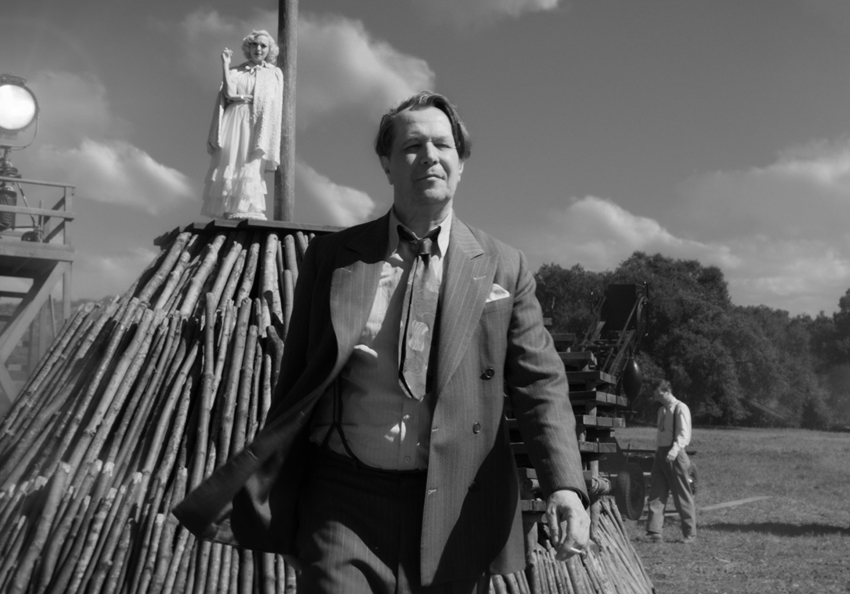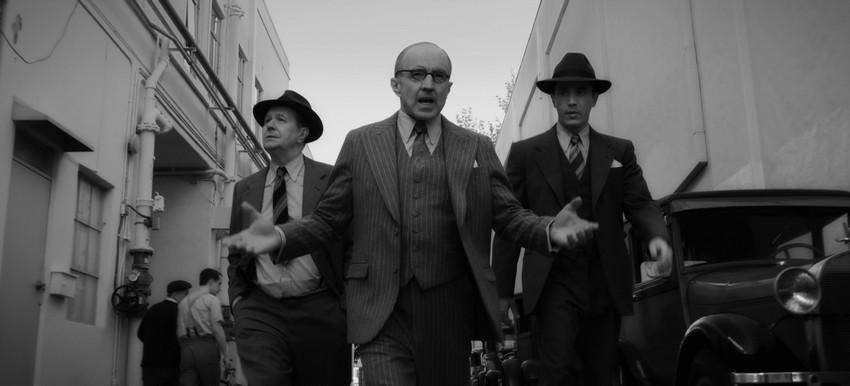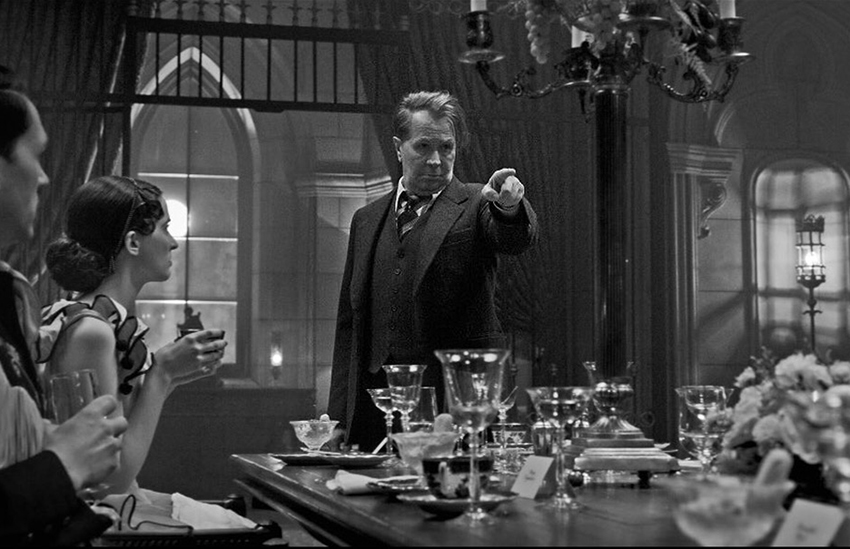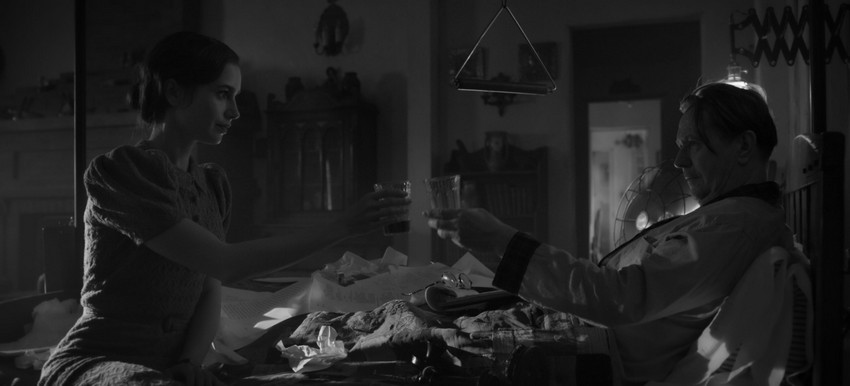
Citizen Kane is considered by many to be one of the greatest movies ever made (or even the greatest according to some studies). A film that served as an inspiration for Hollywood not only through its powerful story and timeless dialogue but also through its many different pioneering film techniques that inspire directors to this day. So naturally, any movie that is going to dissect aspects of what made Citizen Kane such a masterpiece in the first place is going to come under scrutiny to see if it can evoke that same level of greatness.
And to do this, Mank director David Fincher tells a story that is inspired by that classic in every way. Not only is it filmed in black and white like the original, but the overall cinematography, sound design, and the framing of shots are all about transplanting you into that era of filmmaking, trying to elicit that same feeling of watching Citizen Kane while telling its own story. The movie truly is a labour of love for Fincher and a real tribute to the films from that era. More on that later though – let’s first start with the story and narrative that drives Mank.

While legendary filmmaker Orson Welles is largely attributed with the success of Citizen Kane as he wrote, produced, and directed the film, the truth is that the origins of the Citizen Kane script was widely disputed, with his “cowriter”, Herman J. Mankiewicz (Mank), largely believed to be the true source of the masterpiece. After all, whereas Citizen Kane tells the fictional story of a press baron with enormous wealth and influence, who struggles to find love or political success in life, the film is loosely based on the life of William Randolph Hearst whom Mank had a troubled personal relationship with and which he used as inspiration for the story.
And it’s that story that Mank, written by David Fincher’s late father, Jack Fincher, before he passed in 2003, that is being told here. Mank focuses on both the titular character’s struggles with trying to piece together the screenplay while overcoming injury and alcoholism, while also taking you back in time and showcasing his troubled earlier life in Hollywood, particularly his interactions with Hearst that led him to write Citizen Kane.

This jumping back and forth narrative approach forms the crux of how the story is told, as Mank’s past significantly influences the development of the screenplay in the present. Mank (played masterfully by Gary Oldman) was initially hired to write the screenplay for Welles (Tom Burke) without any form of credit in exchange for money that would help him get out of his various gambling debts, but as Mank realizes just how personal this story is to him, he chooses to fight for credit as the script (which eventually won him an Oscar) brings new meaning to his life.
As a film, Mank is a slow-moving effort that does little to rope you in initially and really takes its time to build up to its emotional climax. And while the character of Mank is fully explored in his complexities, important figures like Welles and many of the other people Mank interacts with during the movie, including his relationship with his wife (Tuppence Middleton), film producers Louis B. Mayer (Arliss Howard) and Irving Thalberg (Ferdinand Kingsley), and even Hearst (Charles Dance) are not well drawn out. The only exception here is Mank’s mysterious and flirtatious relationship with actress Marion Davies (Amanda Seyfried), which the film makes deliberate effort to focus on, even if purely to show how the actress inspired the infamous “Rosebud” in Citizen Kane.

It’s a story that will likely frustrate some people who are not familiar with the details of Citizen Kane, as Mank also doesn’t do a good job at explaining these connections and expects you to just make sense of them. The film is also lacking the sort of witty and quotable dialogue that made Citizen Kane such a delight, with much of the dialogue here far too simple and only gaining some relevance due to the execution of its actors.
But while the scripting itself may have its weaknesses, what really draws you into Mank is its excellent execution. The production design and cinematography by Erik Messerschmidt do a superb job in capturing the era of filmmaking while Fincher’s meticulous direction and attention to detail mirror so much of the style of the film that inspired it. The film is also helped by fantastic performances from Oldman and Seyfried in particular, who both truly embody their characters and the era. For Oldman, this is perhaps not surprising given his legendary body of work which has showcased he could play just about anybody (or anything). For Seyfried though, not really known as a dramatic powerhouse, this is easily the best role of her career thus far.

All these parts are rounded out by the strong editing work from Kirk Baxter who does a superb job of balancing the film’s different timelines and maintain the flow throughout. Combined with frequent Fincher collaborators Trent Reznor and Atticus Ross’s swinging and jazzy score, so completely different to the rest of their work, it really makes you feel like you are watching a movie from that period.
It’s that excellent film engineering throughout that is the real joy of watching a movie like Mank, and the reason why many cinephiles will get a major film geek kick out of it. And also why the film will likely get nominated for many awards across the board. The problem with Mank though is that if you are not a massive fan of the detailed complexities of filmmaking or have a connection with Citizen Kane or that era of films, that you are probably not going to get too hyped about this movie. It’s deliberately paced and simply doesn’t illicit the types of swelling excitement or overflowing emotion that the average person is looking for in their entertainment.

So, as a work of art, Mank is a technical masterpiece – though not at the level of Citizen Kane – but as a piece of entertainment, it’s flawed. Perhaps the film releasing on Netflix though is its saving grace as it’s the kind of movie that was never going to get a big draw at the box office. Hopefully now it will get some more attention on a streaming service where people can take their time in getting drawn into its many layers.
Last Updated: December 17, 2020
| Mank | |
|
As a meticulously detailed love letter to one of the greatest films ever made, Mank is a near-masterpiece. As a piece of entertainment though, it is somewhat flawed.
|
|
|---|---|
|
79/
100
|
|




















